Dawn today brought with it another Fourth of July in America. Nearly two and a half centuries have passed since the representatives of the several British colonies in America declared their independence. Even sports fans and gamblers often reflect back on glorious wins. Their excitement echoes the difference when the outcome defies the odds. Victory and independence for America were far from certain. The signers of the Declaration of Independence knew fully this reality. The consequences for losing would be severe. Even just attempting to pursue liberty would bring many challenges and hardships. Such is the way of great accomplishments. As a people, we must acknowledge two truths. The success of the American Revolution did not just defy the odds. The blessings of liberty are a gift from God greater than any athletic achievement. Cherish liberty and thank God for this day.
Estimated reading time: 14 minutes
It Began with Appeals to God
Our founders understood these truths. John Dickinson was among the founders that petitioned first for reconciliation between those living in the colonies and the King of England. An attorney and farmer, he authored numerous essays, many of which were also published in London. In closing one of his essays, he included a prayer on the need for us to draw upon God’s wisdom. He did so as a reminder to both those living in the colonies and the king. Dickinson drew upon scripture, and he quoted Proverbs 8:15.
“But above all, let us implore protection of that infinite good and gracious Being, by whom ‘kings reign and princes decree justice.”
William Federer, the creator of the American Minute, has chronicled numerous examples of formal, public prayer among those who would lead a revolution. Including a May 1774 Virginia House of Burgesses resolution for a “Day of Fasting, Humiliation and Prayer.” Proposed by Thomas Jefferson, the motion expressed Virginia’s support for the people of Massachusetts, as they were suffering through a British blockade of Boston’s Harbor. This day of fasting, humbling, and prayer in Virginia was to occur on the First of June 1774. The call to seek God’s assistance was urgent, and the personal journal of George Washington for that day reflected his own participation.
Our Fundamental Rights Come Not from Government
Without question, the Declaration of Independence is an inspirational work. That document’s lead author, Thomas Jefferson, sought to provide clarity in the cause for independence. He knew that the law and justice are not without a foundation, and they are not left to kings alone to define.
Might does not make right. Those in power may not do as they alone decide. They may not abuse their authority. There is a higher authority.
The declaration was a direct appeal to God’s sovereignty.
“We hold these truths to be self-evident, that all men are created equal, that they are endowed by their Creator with certain unalienable Rights, that among these are Life, Liberty and the pursuit of Happiness.“
The entirety of the document is written using precise language, and the closing returned to a focus on God. That text reads that in declaring independence they were: “appealing to the Supreme Judge of the world for the rectitude of our intentions.” With the word “rectitude,” the founders made clear that they were seeking God’s guidance in ensuring their motivations were right and morally correct.
Beyond War
Among the most important roles performed by John Adams was his serving as America’s second president. His election was the first time such political power was peacefully transferred from one living national leader to another. In 1818, Adams reflected upon the revolution. Holding that the revolution was far more than the war that formalized independence, he wrote:
“The Revolution was effected before the war commenced. The Revolution was in the minds and hearts of the people; a change in their religious sentiments of their duties and obligations.“
Adams went on to explain that before the war the people in America had prayed for the king, when he was believed to be governing “in justice and mercy,” consistent with the dictates of God. When the king was found to have abused his authority, the people looked to God. They then also “thought it their duty to pray for the continental congress and all the thirteen State congresses.” Having been created by God, the people had concluded that no king could justly rule in violation of God’s teachings.
The War Itself
Perhaps because we today know the outcome of that 1776 declaration, we forget that active fighting in the war lasted several years. We forget as well that the American forces lost more battles than they won. But, those seeking liberty endured, and remained faithful in their cause. Like David before them, many of those seeking independence looked to God for the strength to confront the Goliath that certainly awaited.
At the time of the Revolutionary War, the King of England commanded a powerful military force. The British Army and Navy had experienced substantial victories against France and Spain in the early and mid 1700s.
In contrast, the American colonies had no standing armies. The homeland was loosely defended from an increasing British military occupation by local militias. Boston was overrun by British soldiers under the command of General Thomas Gage. Determined to crush the growing resistance to British rule, in April 1775, Gage sent 1,500 troops to seize the stores of weapons held by the militia in Concord, Massachusetts. This action sparked the first battles of the war.
A Call to Arms
Thanks to the famous midnight rides of Paul Revere and William Dawes, and then Dr. Samuel Prescott, word of the British military move from Boston was spread quickly. By the early morning of 18 April 1775, militiamen across the countryside beyond Boston began to assemble.
At the North Bridge in Lexington, Massachusetts, Captain John Parker and approximately 70 militiamen slowed the initial advance of British soldiers. A militia contingent of about 400 men then readied themselves to defend Concord, and the British assault there failed. The British were forced to retreat, and remained under continued militia attack, back to Boston. The militia inflicted three times the number of casualties on the British as they received. The outcome of this first engagement was beyond astonishing. So much so, the clash became known as the “shot heard ’round the world.”
An American Army
With the growing tensions, the Continental Congress authorized the creation of the Continental Army in June 1775. Previously an officer in the Virginia militia serving within the British colonial forces, and a veteran of the French and Indian War, George Washington was selected as commander-in-chief of America’s first army. In an article posted on the Mount Vernon website, historian William P. Kladky observed:
“When Washington assumed command, the Continental Army truly was not even an army. Rather, it was a loosely and poorly coordinated band of militias and citizen-soldiers under control of the individual states. There were no established protocols for exercising coordinated authority, for supplying and feeding the troops, for transportation, or any other of the myriad tasks necessary for a field army.”
Faith and Miracles
Without question deep religious conviction was essential in the fight for American independence. Many of the leaders in the cause were men of faith. George Washington was among those who actively sought God’s grace.
Washington’s May 1776 Day of Reflection
Consistent with the guidance from the Continental Congress, Washington declared 17 May 1776 as a “Day of Fasting, Humiliation and Prayer” for the Continental Army. The congress would make annual calls for such reflection, repentance, and the seeking of God’s support in building the “freedom of America upon a solid and lasting foundation.” General Washington invoked the assistance of chaplains within the army for religious guidance and support. These efforts included another day of fasting, humiliation, and prayer on 22 April 1778. He wrote:
“The General directs that the day shall be most religiously observed in the Army; that no work shall be done thereon, and that the several chaplains do prepare discourses.”
Escape from New York
Among the most visible signs of a specific miracle in support of independence occurred early in the war. Most of the army under Washington’s command had come to the defense of New York City in early 1776. The British sought to seize control of the city, as well as its harbor, a key source of resupply for the Continental Army.
An armada of 400 British ships led by Admiral Richard Howe took control of the New York Harbor and Staten Island in July. By late August, 32,000 soldiers under the command of British General William Howe, were ready to move against the American forces further into the city. The ensuing battle for New York began in Brooklyn on the 22nd of August. The fighting on Long Island was intense. Washington’s combined force of 19,000 soldiers was not enough to hold back the British attack. Worse, 9,000 of the retreating continental soldiers had been pushed back to the East River, and there they were at risk of capture. Washington ordered their evacuation across the river to Manhattan.
However, the task required several hours, and for success such a maneuver needed to proceed without being detected by the British. The withdrawal began in darkness, but was still underway as dawn was approaching. But for the development of a thick fog, not known for that area, particularly during that season of the year, the evacuation would have failed. A loss on that scale, just a month after independence had been declared, would have been devastating to the cause of American liberty.
A True Leader Prays for Guidance
The odds were not with the Continental Army. The hardships and challenges were many. Twice as many soldiers in the American forces died of illnesses or starvation than of wounds suffered in combat. The winter of 1777 was particularly arduous, and the army suffered grievously from the terrible conditions at Valley Forge, Pennsylvania.
A particularly moving account of George Washington praying was included in an early biography by Mason Locke Weems. The Life of Washington was first published in 1800, a year after Washington’s death. The book includes a story attributed to a Pennsylvania Quaker by the name of Isaac Potts. According to the account, Potts came upon Washington, as the general prayed alone in the woods near the encampment at Valley Forge.
Potts is said to have been so moved by what he had observed that he was drawn to support the American cause. Critics of the Weems biography hold that the author freely used myths in his storytelling of Washington’s life. Yet, the visual of Washington at prayer remains a valid inspiration, as we know Washington not only prayed, he believed God guided the creation of the United States, and he encouraged others to seek God.
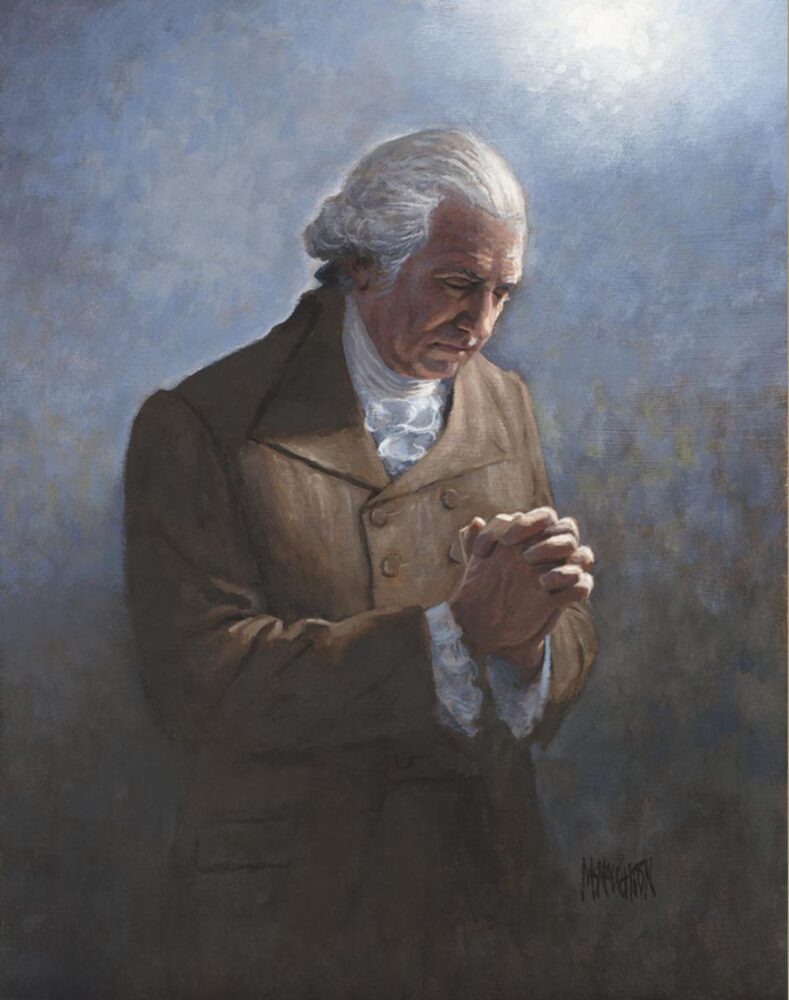
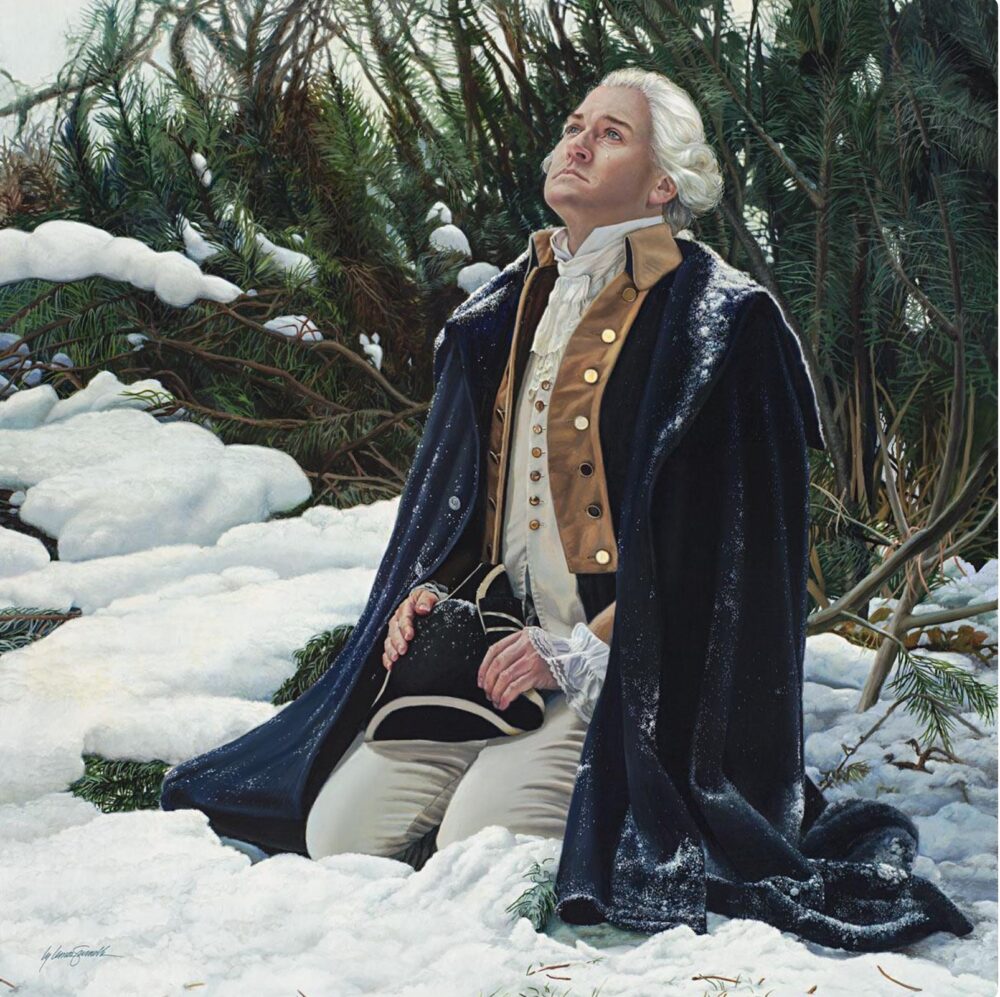
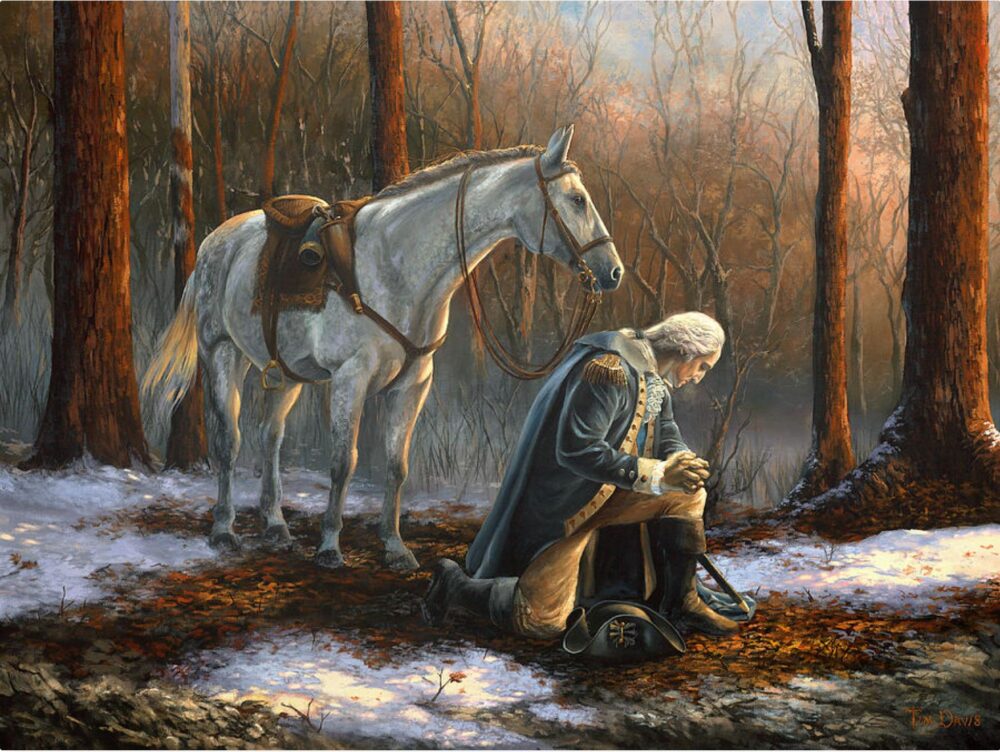
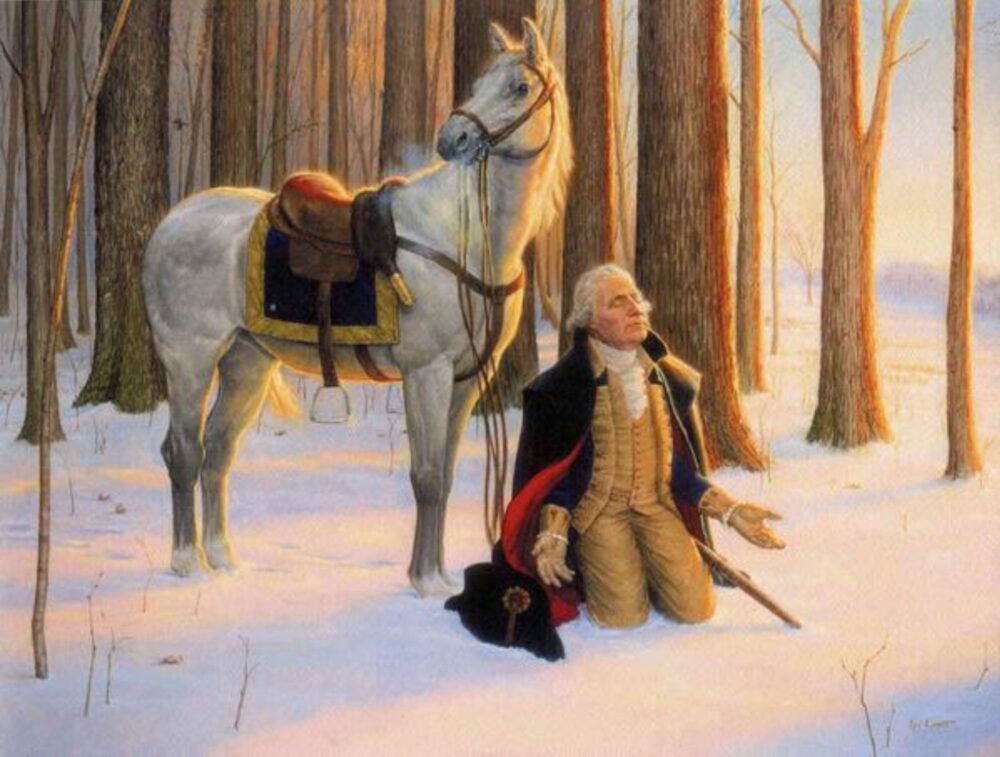
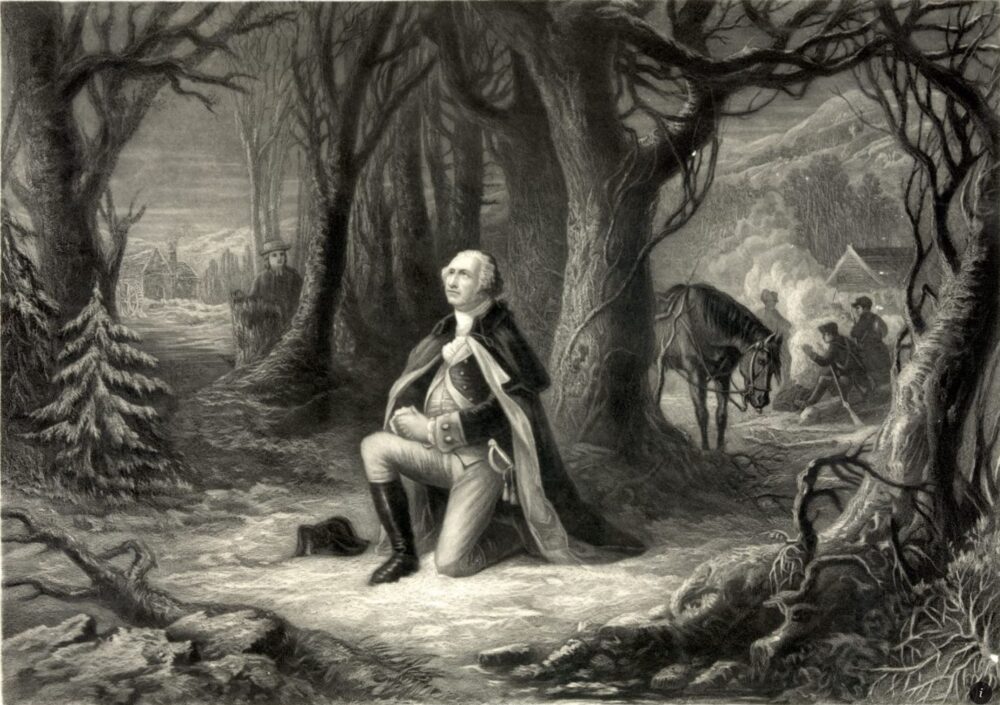
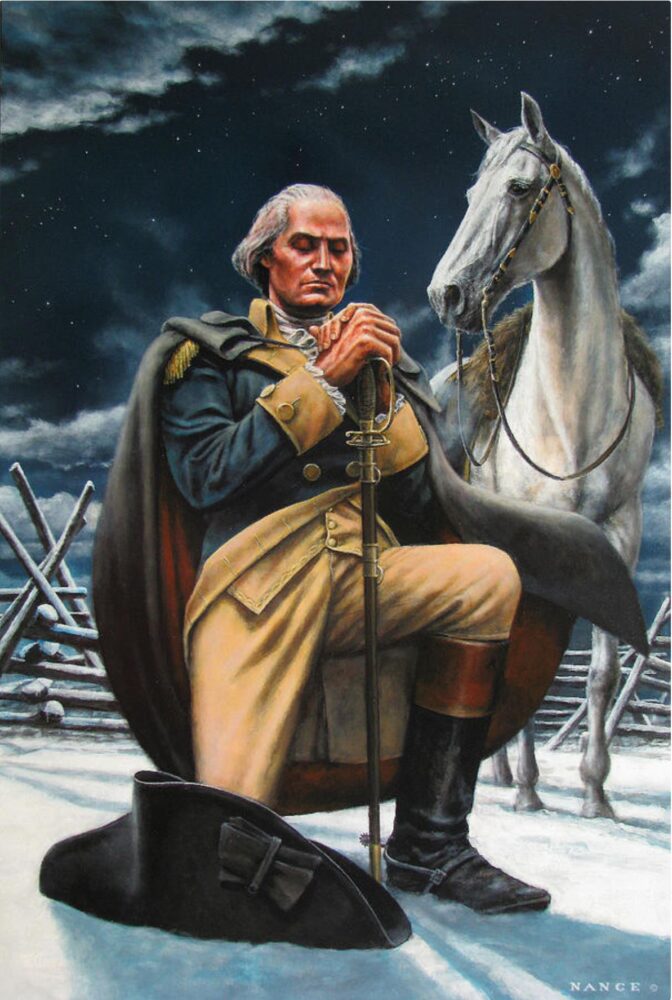
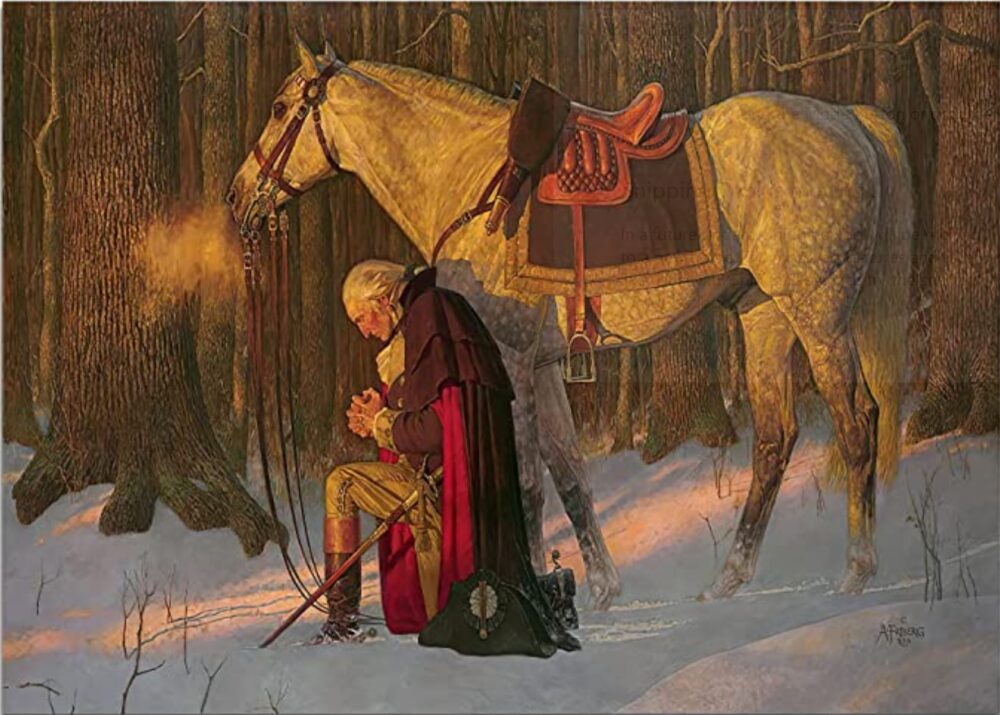
Victory at Yorktown and Overall
Against the odds, those seeking to make the 1776 declaration of July Fourth a reality persevered. Their ability to avoid their anticipated defeat lasted long enough for this new union of American states to garner a much needed ally. Through the diplomatic efforts of Benjamin Franklin and others, France signed two treaties with the American forces in 1778. France provided much needed cash, supplies, and a naval force strong enough to get them to the patriot forces. France also provided additional military expertise and reinforcements. Approximately 12,000 French soldiers and 22,000 naval personnel provided assistance to the American war effort.
In late September 1781, General Washington was able to put a stranglehold on the British Army in Yorktown, Virginia. There 9,000 soldiers were under the command of General Charles Lord Cornwallis. In a surprise move, Washington had marched much of his army south from New York state. Together with their French allies, the American forces put the British garrison under an extended siege and naval bombardment. After a relentless three-week assault by the allies, General Cornwallis surrendered his forces to the American and French allies on the 19th of October 1781.
While the war was not yet officially over, the Battle at Yorktown was the last major engagement. The Treaty of Paris, formally ending the war, was signed by the representatives of the newly recognized United State of America and Great Britain on 3 September 1783.
Continuing Reliance on God
As the war concluded the work to establish a republic consistent with the ideals expressed in the Declaration of Independence took on increased importance. That importance remains necessary, and it should be active among us even today.
America struggled in its first few years in outlining the form and substance of the national political union. From May through September 1787, the states held a Constitutional Convention in Philadelphia. Our present constitution was agreed upon by the delegates on the 17th of September. Many Americans may not be aware that we honor that day each year as Constitution Day.
According to James McHenry, a Maryland delegate to the convention, Benjamin Franklin was subsequently asked by a woman in Philadelphia what form of government had been decided upon. Franklin is said to have responded: “A republic. If you can keep it.”
An Oath, With God’s Help
It was fortunate and fitting that George Washington was elected as the nation’s first president. Washington understood the need for unity among the states of the newly formed nation. He understood as well the challenges the nation faced from a world who believed in the odds. The odds that the nation would fall to internal political squabbles and international challenges.
The United States Constitution holds that the president upon taking office must swear an oath. Washington took the oath in America’s first and temporary capitol, New York City, on the 30th of April 1789. Perhaps it should come as no surprise that in his first inaugural address he looked to a higher authority. He reminded the new nation of the need to look to God for continued guidance. On this point, he instructed:
“Such being the impressions under which I have, in obedience to the public summons, repaired to the present station; it would be peculiarly improper to omit in this first official Act, my fervent supplications to that Almighty Being who rules over the Universe, who presides in the Councils of Nations, and whose providential aids can supply every human defect, that his benediction may consecrate to the liberties and happiness of the People of the United States, a Government instituted by themselves for these essential purposes: and may enable every instrument employed in its administration to execute with success, the functions allotted to his charge.”
Maintaining Our Freedom
The challenge of remaining faithful to God has stood for all time. It bears repeating for a nation such as ours. The blessings of liberty are a gift from God. Cherish liberty and thank God for this day.
As Ronald Reagan observed in January 1967: “Freedom is a fragile thing and it’s never more than one generation away from extinction. It is not ours by way of inheritance; it must be fought for and defended constantly by each generation, for it comes only once to a people.”
We are interested in your thoughts, and invite you to comment below.
We also encourage our followers to read again our editorial, American Independence Day, Our Day, from last year. For those concerned about justice, equality, liberty, and public safety, American Independence Day, should provide encouragement and renewed commitment to the principles on which the nation was founded. At Secure 1776, we still believe that all people are endowed by their Creator with certain unalienable rights, and that among these are life, liberty, and the pursuit of happiness.
Thank you God, for the blessings of liberty.


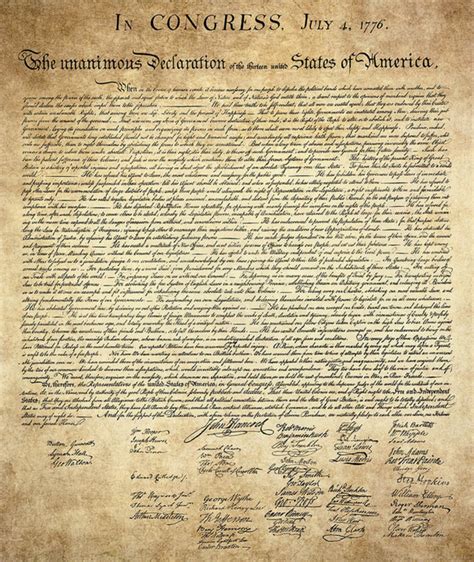
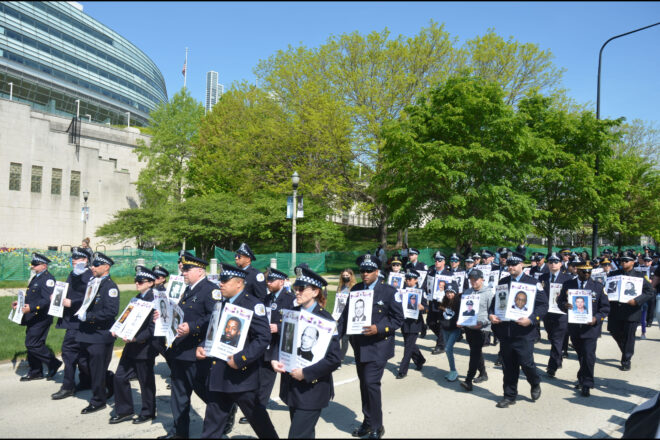
So well written. This article provides us with an important reminder of the brave men who declared the independence of our nation – and the critical role that God will always play in it.
With God, all things are possible.